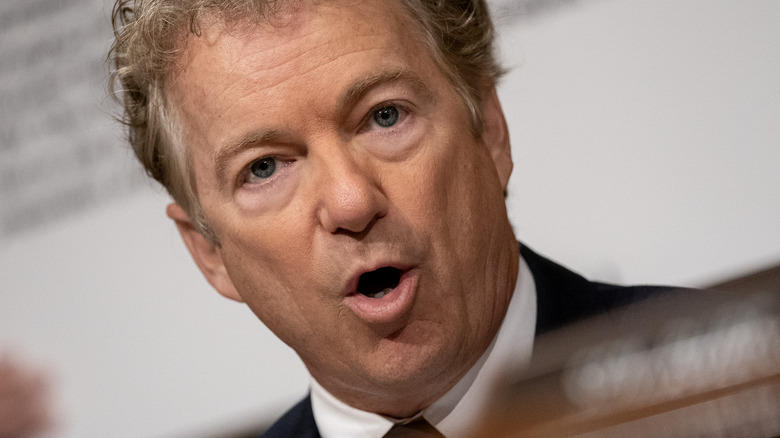Rand Paul Could Be In Hot Water. Here's Why
Throughout most of the entirety of the COVID-19 pandemic, Republican Sen. Rand Paul has been one of the staunchest opponents when it came to safety measures to curb the spread of the deadly virus. Throughout 2020 and 2021, Paul, who has remained one of ex-President Donald Trump's premier acolytes, has spent the better part of the past 18 months expressing his disdain over almost every iteration of mask mandates. By all appearances, Paul's aggressive crusade a self-appointed cause which, most recently, led to Paul's week-long suspension from YouTube over his claims that masks were ineffective, per ABC News — since data-driven guidelines published by the CDC and the World Health Organization say otherwise.
Now, according to a report from The Washington Post, it seems that Paul's convictions regarding the coronavirus might only go so far — and that a recent disclosure made by Paul might be a sign of trouble for the senator. So what exactly is going on here? Keep on reading to find out all about it.
Is Rand Paul in trouble for insider trading?
As The Washington Post reported on August 12, the Kentucky lawmaker disclosed in a filing with the Senate that his wife, Kelley Paul, purchased stock in Gilead Sciences, a biotech company which has been instrumental in manufacturing an antiviral medication to treat COVID-19. But, according to the outlet, Paul only disclosed this information approximately 16 months after the transaction had been made. Though The Washington Post noted that the deal occurred in February 2020 — nearly a month before the widespread threat of COVID-19 was publicly known — Paul making this disclosure now could be a violation of the Stock Act, "which is designed to combat insider trading" and requires lawmakers to inform Congress of trades within a 45-day window.
Paul spokesperson Kelsey Cooper attempted to mitigate the optics in a statement to the paper. "Last year Dr. Paul completed the reporting form for an investment made by his wife using her own earnings, an investment which she has lost money on. This was done in the appropriate reporting time window," she claimed. "In the process of preparing to file his annual financial disclosure for last year, he learned that the form was not transmitted" — hence the August disclosure. The Washington Post went on to note that Rand's spokesperson noted that the senator "sought guidance from the Senate Ethics Committee," she said, "and filed the supplemental report" on August 11 (that report was reportedly due in May).
It is unclear as of yet whether Paul will face any repercussions.


